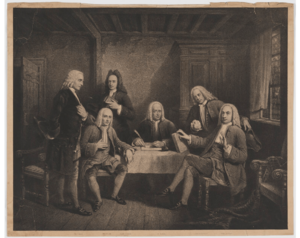William Wilson (Secession minister) facts for kids
Quick facts for kids William Wilson |
|
|---|---|
| Personal details | |
| Born | 1690 |
| Died | 1741 (Burgher split 1747) |
| Nationality | Scottish |
| Denomination | (1) Church of Scotland (2) Secession Church |
William Wilson was an important Scottish minister born in Glasgow on November 9, 1690. His father, Gilbert Wilson, lost his land because he supported the Presbyterian faith. William was named after King William of Orange. He studied at the University of Glasgow and became a minister in 1716.
William Wilson was a key figure in forming the Secession Church. This new church group broke away from the main Church of Scotland. He and three other ministers, Ebenezer Erskine, Alexander Moncrieff, and James Fisher, were suspended from their roles in 1733. They were later officially removed from the Church of Scotland in 1740. William Wilson became a professor for the new Secession Church. He worked very hard and passed away on October 8, 1741.
Contents
Early Life and Education
William Wilson was born in Glasgow, Scotland. His father, Gilbert Wilson, owned a small estate. However, Gilbert lost his property because he was a Presbyterian. Presbyterians were a group of Christians who believed the church should be run by elders, not bishops. During the time of King Charles II, Presbyterians faced difficulties.
William's mother was Isabella Ramsay. He was named after King William III, who was also known as William of Orange. William Wilson went to Glasgow University. He finished his studies in 1707. After university, he was approved to preach in 1713. In 1716, he was chosen to be a minister in Perth.
Becoming a Minister
William Wilson quickly became well-liked in Perth. He showed great fairness in his actions. For example, he did not fight in court for his grandfather's estate. He also refused his salary because the town council wanted to pay him with money meant for charity. This showed his dedication to his beliefs.
The Marrow Controversy
In 1717, a big disagreement happened in the Church of Scotland. It was called the Marrow of Modern Divinity controversy. This was about a book called 'The Marrow of Modern Divinitie'. The book talked about how people are saved by God's grace. Some church leaders thought the book's ideas were wrong.
William Wilson supported the book's views. He agreed with other ministers like Thomas Boston and Ebenezer Erskine. They believed the church assembly was wrong to condemn the book.
Forming the Secession Church
Another disagreement arose in 1732. The church assembly decided that when a church leader (called a patron) didn't choose a minister, the local landowners and elders would choose instead. William Wilson and others believed that the church members themselves should have the right to choose their minister. They felt this right was very important.
Ebenezer Erskine preached a strong sermon about this issue. He was criticized for it. On May 14, 1733, William Wilson, Alexander Moncrieff, and James Fisher joined Erskine in protesting this decision. The church assembly was upset by their protest. They asked the ministers to take back their words. When they refused, the church leaders suspended them on August 9, 1733. On November 12, they were declared no longer ministers of the Church of Scotland.
On November 16, these four ministers officially broke away from the church. On December 6, they formed their own group called the Associate Presbytery. This was the beginning of the Secession Church.
Later Life and Legacy
Even though the main church offered to let them return in 1734, William Wilson and his friends felt that other problems still existed. They continued with their new church. On November 5, 1736, the Associate Presbytery made William Wilson their professor of theology. This meant he would teach new ministers.
On May 15, 1740, the Secession ministers were officially removed from the Church of Scotland. Many people in Perth supported William Wilson. They built a new church building for him, and many came to hear him preach.
The disagreements and hard work took a toll on William Wilson's health. He passed away in Perth on November 8, 1741. He was buried in Greyfriars' cemetery in Perth. A monument was put up in his memory. William Wilson is remembered for his strong beliefs and his role in starting a new church movement in Scotland.
Family Life
William Wilson married Margaret Alexander on June 20, 1721. They had several children together. One of their daughters, Isabella, married John Muckersie, who was also a minister in the Secession Church. Another daughter, Mary, married William Jameson, a minister as well. One of their sons, John, also became a minister.
 | Isaac Myers |
 | D. Hamilton Jackson |
 | A. Philip Randolph |


